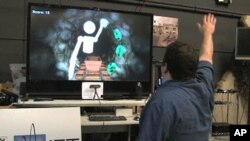Computers are changing our daily lives. They are even finding their way into medicine, where they are used to train medical providers and even offer therapy to patients. At the Institute for Creative Technologies at the University of Southern California, scientists are creating high tech programs for the U.S. military that will also help civilians.
Soldiers scarred by their wartime experiences can overcome their trauma through an interactive program developed at USC, says psychologist Skip Rizzo.
"The patient is in complete control, but we can put them in an environment and gradually ramp up the provocative nature of that environment," said Rizzo. "And in that way, the patient is given the opportunity to confront challenging traumatic memories and emotionally process some of the demons that come from them."
A computer-generated military veteran acts as a counselor for troubled soldiers or vets in an online program, also being created with military funding. The character is a simulated life coach, says program developer Josh Williams.
"They can be given a preliminary assessment of whether they should be more concerned about the symptoms that they're experiencing, and given that assessment, the 'sim coach' can escalate the conversation to suggest, well, you really should talk with someone," Williams explained.
The simulated coach can refer the patient to a counseling center in his or her area.
In another virtual program, novice therapists hone their skills with simulated soldiers, suffering from post-traumatic stress.
"We use speech recognition technology, so as you talk to the character, he recognizes your speech. That goes into the system, and the system comes up with an answer to your question, and responds appropriately," explained Computer scientist Patrick Kenny.
The USC researchers are also creating programs to rehabilitate the physically disabled, by modifying existing game technology. Mark Bolas says this system uses a 3-dimensional camera from Microsoft's "Kinect" system.
"Let's say you want to put somebody through an exercise where they have to show balance. Well, this three-dimensional camera could quickly determine that my hand is reaching out here, this [other] hand is reaching out there, but in fact, I can reach further with my right hand," noted Bolas.
Program developer Evan Suma says the system can be customized for individual patients.
"And so the therapist is able to configure or set exactly how the patient would interact with the game, and then they could just play it," added Suma.
This virtual reality center blends insights from the academic world, Hollywood and the military, says researcher Skip Rizzo.
"They are three completely different cultures, but when you throw them all together in a building and say, have at it, build some VR [virtual reality] stuff, you get some interesting results," noted Rizzo
Rizzo says these virtual programs cannot take the place of human interaction, but they do provide additional tools for therapists.




